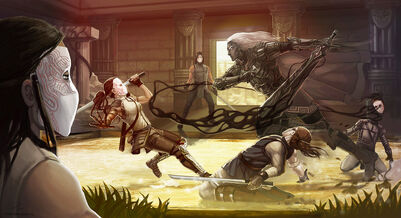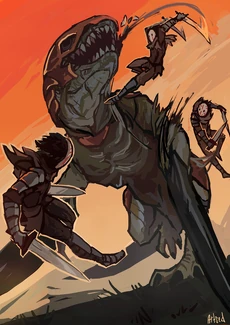
'Blacksword visits' Interpretation of Anomander Rake amongst the Seguleh
by Shadaan and Tinyshiloh

Interpretation of the Seguleh fighting a K'Chain Che'Malle by Artsed
The Seguleh (a First Empire word for 'the Anvil') were a warrior people inhabiting an island to the southwest of the continent of Genabackis. Trained in combat from their youths, the Seguleh gained a reputation as some of the finest swordsmen in the entire world. Although rarely sighted outside of their native island, Seguleh expeditions were known to have occurred on occasion.
Seguleh seemed to be of similar appearance - medium height, whip lean, wearing light armour and a white, enamelled mask.[1][2]
Notable Seguleh
- Anomander Rake, technically held the rank of Seguleh Seventh, which was passed to Dassem Ultor when he defeated Rake.
- Beru, of the Thirtieth
- Dassem Ultor
- Enoc, one-time Third[3]
- Felash's handmaiden
- Gall, Third (after Mok)
- Ina
- Iron Bars, technically held the rank Leal previously held
- Jan, Second
- Lazan Door
- Leal
- Lo, Eighth
- Madrun
- Mok, Third
- Oru, Eleventh[4]
- Palla, Sixth
- Rell
- Sall, of the Three-Hundredth
- Senu, Eleventh Level Initiate
- Studlock, commander of the Revenants
- Thurule (also spelled 'Therule')[5]
Seguleh Society
Seguleh society was a hierarchy exclusively based on the martial prowess of the individual. All Seguleh who successfully survived to adulthood donned a mask with a number of markings signifying their position within the Seguleh hierarchy. The overall commander was the Seguleh First and he had no marks on his mask, the Seguleh Second was second-in-command with one mark on his mask, and so on. The top ten in rank were known as the ruling Ten, or Eldrii.[6] The lowest level warriors were First Level Initiates known as Blackmasks.[7] The substance used to mark a mask was described in one case as a mixture of charcoal, saliva, and human blood.[8]
In order to advance within the society, a warrior of a lesser rank had to defeat a Seguleh warrior of a higher rank, in single combat, thus acquiring that warrior's position within the society. The 1,000 highest ranked Seguleh were known as the Agatii, or Honoured Thousand.[6] A high ranking Seguleh could take the role of Yovenai, which roughly translated to some combination of patron, commander, and teacher.[9]
The Seguleh saw fighting as "a form of religious dedication and expression." They were committed to perfection of form and technique. At the highest level, duels could be fought without bloodshed, the winner to be determined based on a judging body's appraisal of speed, technique, and execution. To question the judges' ruling was to risk being expelled from the martial order.[10]
The Seguleh rarely spoke, communicating instead via body language. They asserted dominance with posture, faint gestures, stance, and head tilts.[7] Seguleh of a lower rank were required to act humbly and to be servile towards members of higher rank, lest the former provoke a disciplinary attack by the latter. If a lower ranking warrior wished to challenge one of higher rank, he could do so by acting superior towards the one whom he wished to challenge.
Sustained eye contact was considered a challenge,[11] and visible unease was treated as submission.[7] The Seguleh were an intelligent society, despite the culture of pugilism as a form of advancement in 'political' rank.
Not all Seguleh were fighters. Some were farmers, craftsmen, or servants. But these members of society were forbidden to wield weapons and were at the bottom of the social ladder.[12]
When encountering non-Seguleh, verbal communication was handled by the lowest ranking member present and was considered a shameful act. If an outsider attacked or merely possessed a weapon in a Seguleh's presence they would be slain, regardless of whether they were aware of Seguleh custom. If an outsider was able to defeat a Seguleh, they gained their opponent's rank just as if they had been a Seguleh themselves and were subject to the same right of challenge.[13] The Seguleh did not fight women unless attacked.[14]
The Seguleh also had provisions for outsiders who helped them. They were classified as Eshen-ai, outsiders with countenance, as Sall described it. It meant that they were willing to protect the person who was under their patronage, as evidenced by Lo and Sall as they fought Dernan and his army to protect Yusek and nurse her back from cold so that they could continue their search for the monastery.[15]
Currency
Seguleh currency resembled ridged bars.[16]
History
Not much was known to outsiders of the Seguleh, save that they were very fierce warriors and tended to keep to themselves. It was said that Anomander Rake had visited the island and, due to his perceived arrogance, provoked countless attacks by the Seguleh present. A skilled swordsman, Anomander defeated numerous Seguleh warriors, unknowingly advancing through the hierarchy and achieving the rank of Seguleh Seventh. Frustrated and uncomprehending, Anomander left the island without taking the mask of his rank, an act which angered all Seguleh and persisted into the modern Malazan period of history as this was considered an insult to their customs and traditions.
The Seguleh had had a historical rivalry with the Moranth from the past. The two societies fought each other almost incessantly, their fights being brutal. At some point, the Seguleh were forced into an exile, leaving Darujhistan's environs, and settling down at an island that came to be known as the Seguleh Island.[17]
The society of the Seguleh was created by the last Tyrant of Darujhistan, to act as his personal guard.[18]When the Tyrant went to war with the Moranth, occupying Moranth colonies and offering no terms or conditions, the Moranth lost their colonies to the Seguleh.[19] After the Tyrant had been defeated and interned in the barrow, the Seguleh were exiled,[20] and that is how they came to live in the Island. The origins of Seguleh was an ancient knowledge known only to the original First (the First during Jan's earlier time as Second) and this knowledge was lost when the First went missing.[21]
In Memories of Ice
The Pannion Domin provoked the Seguleh by sending priests to their island in an attempt to convert them. The Seguleh tasked their Blackmask initiates with killing the intruders. Eventually, the incessant arrivals began to interfere with Seguleh discipline and mindfulness. When threatened with an invasion, the Seguleh welcomed battle, even offering gifts to the Pannion Domin to assure the conflict would take place. But the Pannion Domin was insulted by the offer. Tired of the tedious discourse, the Seguleh sent a punitive army of three (Mok, Thurule, and Senu) to slay the one sending his priests to the island.[7]
Notes and references
- ↑ Return of the Crimson Guard, Book 2 Chapter 1, UK Bantam Press edition p.263
- ↑ Memories of Ice, Chapter 1
- ↑ Orb Sceptre Throne, Chapter 2
- ↑ Orb Sceptre Throne, Chapter 20
- ↑ Toll the Hounds, Chapter 13, US TPB p.441
- ↑ 6.0 6.1 Orb Sceptre Throne, Chapter 10, US HC p.303
- ↑ 7.0 7.1 7.2 7.3 Memories of Ice, Chapter 5
- ↑ Memories of Ice, Chapter 1
- ↑ Return of the Crimson Guard, Book 2 Chapter 1, UK PB p.267
- ↑ Return of the Crimson Guard, Book 3 Chapter 2, US HC p.578
- ↑ Memories of Ice, Chapter 1
- ↑ Return of the Crimson Guard, Book 3 Chapter 2, US HC p.578
- ↑ Return of the Crimson Guard, Book 2 Chapter 1, UK PB p.263-267
- ↑ Memories of Ice, Chapter 22, UK MMPB p.930
- ↑ Orb Sceptre Throne, Chapter 8
- ↑ Gardens of the Moon, Chapter 7, US HC p. 176
- ↑ Orb Sceptre Throne, Chapter 2
- ↑ Orb Sceptre Throne, Chapter 15
- ↑ Orb Sceptre Throne, Chapter 19
- ↑ Orb Sceptre Throne, Chapter 2
- ↑ Orb Sceptre Throne, Chapter 2
